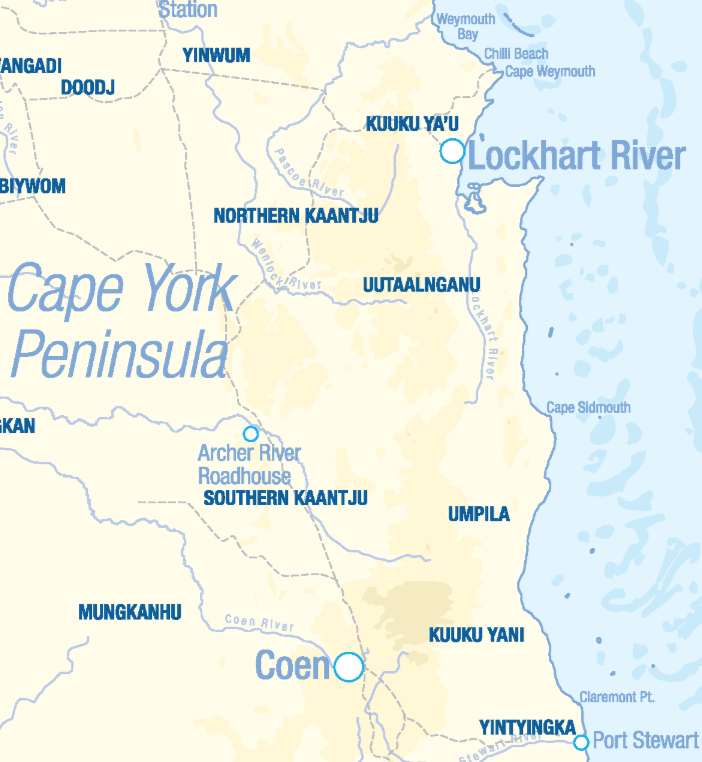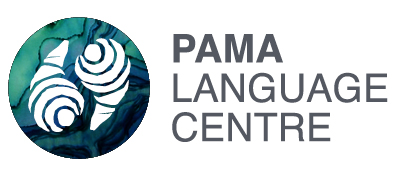Kuuku Ya’u

DISCLAIMER:
The locations of the language varieties of Cape York Peninsula shown on this map are not intended for Land Claim use, and are an approximate guide only. Individual language project locations are based on information from publicly available documents.
This map is a work in progress and is to be regarded as a dynamic draft. Pama Language Centre welcomes additions and corrections to the draft map and to information about the language varieties listed.
Kuuku Ya’u is one variety within a language which does not have a general name. Classically, there were at least six named and mutually-understandable dialects within this language. These were: Kuuku Ya’u, Umpila, Kuuku Yani, Uutaalnganu, Kaanju and Kuuku Iyu (Thompson 1976, Thompson 1988). All of these dialects are associated with country on the north-east coast of CYP, from around Massey Creek (north of Princess Charlotte Bay) to around Olive River (Shelburne Bay). Kuuku Ya’u country covers around 90 kilometers of coastline stretching from the Pascoe River to the Olive River (Chase 1980, Thompson 1988). Genetically, Kuuku Ya’u and other varieties in this group are classified as belonging to the Middle Paman subgroup of Paman languages (Hale 1976, Verstraete and Rigsby 2015:192-194). The language has not been spoken regularly day-to-day for some decades, with a small number of elderly speakers remaining and a few dozen semi-speakers spread across the dialects of Umpila, Kuuku Ya’u and Kaanju.
Kuuku Ya’u and the other dialects in this language are very closely related. They are mutually intelligible with no known grammatical differences and a high level of shared words. Thompson, in a comparative analysis, noted 87% of vocabulary in common between Umpila and Kuuku Ya’u (Thompson 1988:4). There are a number of emblematic vocabulary differences, such as, dialect variation in verb forms for ‘look’ and ‘eat’, which speakers appeal to in distinguishing the dialects. The Kuuku Ya’u word for ‘look’ is kuuchanya and the dialect and the people affiliated with the dialect can be referred to by a nominalised form of this verb, e.g kuuchanyu ‘the dialect where you say kuuchanya for ‘look’ or ‘the people that speak kuuchanya for ‘look’.
Hale, Kenneth L. 1976. Phonological developments in particular Northern Paman languages. In Peter Sutton (ed.), Languages of Cape York, 7–40. Canberra: Australian Institute of Aboriginal Studies.
Thompson, David. 1988. Lockhart River ‘Sand Beach’ Language: An Outline of Kuuku Ya’u and Umpila. Darwin: Summer Institute of Linguistics.
Thompson, David. 1976. Distribution of dialects along the East Coast and hinterland of the Cape York Peninsula, Queensland. In Peter Sutton, Languages of Cape York, 232–235. Canberra: Australian Institute of Australian Studies.
Verstraete, Jean-Christophe and Bruce Rigsby. 2015. A Grammar and Lexicon of Yintyingka. Berlin: Mouton de Gruyter.
| AUSTLANG reference | Y22 |
| AUSTLANG reference name | KUUKU YA’U |
| OTHER REFERENCE CODE(S) | Ethnologue ISO 639-3: kuy |
| LANGUAGE VARIETY NAME, PHONETIC TRANSCRIPTION | |
| LANGUAGE VARIETY NAME, PHONEMIC TRANSCRIPTION | |
| LANGUAGE VARIETY COMPLEX | Unnamed: Kuuku Ya’u is one variety within a language which does not have a general name. |
| LANGUAGE STATUS | Revitalisation |
| PRACTICAL ORTHOGRAPHIES | UMPILA/KUUKU YA’U ORTHOGRAPHY 1988
Orthography presented in Thompson 1988 and used for most resources onwards. Thompson, David. 1988. Lockhart River ‘Sand Beach’ Language: An Outline of Kuuku Ya’u and Umpila. Darwin: Summer Institute of Linguistics. |
| DICTIONARY | No dictionary is currently available, but a number of extensive wordlists have been produced, for example, Hill and Thompson 2013, Thompson 1988.
Hill, Clair, and David Thompson. 2013. Kuuku Ya’u and Umpila Wordlist. Cairns: Lockhart River Aboriginal Council. Thompson, David. 1988. Lockhart River ‘Sand Beach’ Language: An Outline of Kuuku Ya’u and Umpila. Darwin: Summer Institute of Linguistics. |
| FIND A TRANSLATOR | There are currently no accredited translators. |
| CONNECT WITH SPEECH COMMUNITY | The following groups are active in language and culture work: Umpila group; Puuya Foundation; Kuunchi kakana “Families together”; Lockhart River State School; Lockhart River Arts and Cultural Centre. |



